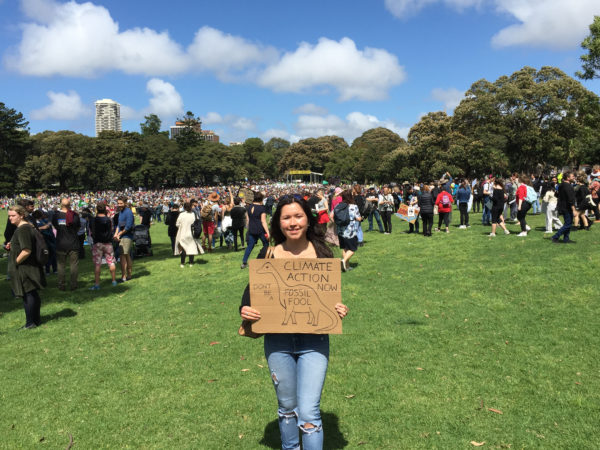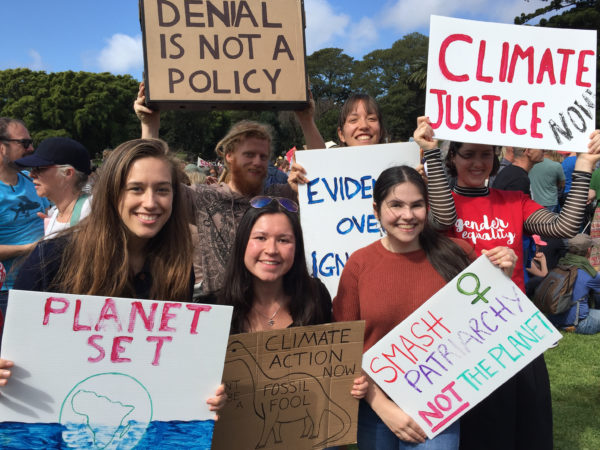The atmosphere at the strike was phenomenal. Thousands of passionate individuals from all walks of life – students, workers, the elderly, families with young children – gathered to demand system change, not climate change.
With over 7.6 million people in attendance worldwide, including over 350,000 in Australia, this was the largest climate strike in history. This international day of action across 185 countries was an amazing feat of community organising.

ActionAid Australia activist Emma at the September 20 Sydney Climate Strike
You’re never too small to make a difference.
While I was inspired by the way 16-year-old Greta Thunberg protested by herself outside the Swedish Parliament, it’s important to acknowledge the equally inspiring campaigns led by many other young women activists.
Ridhima Pandey, at only 9 years of age, filed a lawsuit against the Indian Government for climate inaction. Autumn Peltier, a 15-year-old Wiikwemkoong First Nation advocate, has been campaigning fiercely for clean water, and appointed Chief Water Commissioner of the Anishinabek Nation. Nina Gualinga, an Indigenous woman leader of the Kichwa community of Sarayaku, has been fighting to protect the Ecuadorian Amazon and advocating for Indigenous rights since she was 8. She’s been awarded the highest youth conservation award from the World Wide Fund for Nature (WWF).
In Vanuatu and the Philippines, movements led by Women I Tok Tok Tugeta in Vanuatu and the National Rural Women Coalition are elevating women’s voices and advocating for the importance of women-led humanitarian and climate action.
These activists and movements are from communities most impacted by climate change. And their limited media coverage raises questions as to why their achievements have largely been ignored by the media.

Smash the patriarchy, not the planet
There’s been a lot of criticism directed at young women activists calling on world leaders for action. While their critics attempt to distract the political focus away from the climate crisis, it highlights the importance of smashing the patriarchy, not the planet.
While standing among the crowds at the Global #ClimateStrike, united in solidarity to protect communities and the planet, I felt a sense of hope among the chaos of our current climate crisis. Hope in the knowledge that together, we can bring about the change that the world needs.
People power is an incredible force in creating systemic change. Throughout history, protests have led to immense transformative change in society. Let us consider the anti‐slavery movement, the women’s suffrage movement, the civil rights movement, and the feminist movement. If not for people coming together in protests for these causes, we’d be living in a very different world today.
Our leaders have been wilfully ignoring the current climate crisis. But it’s only a matter of time before people power will win over corporate fossil fuel interests.
In the words of Greta Thunberg, “The world is waking up. And change is coming, whether you like it or not.”
Emma is part of ActionAid’s people-powered movement to stand in solidarity with women around the world demanding a fairer and more equitable world. Join us by signing up here.